7 Things Your Hair Can Tell You About Your Health
By ANNAKEARA STINSON
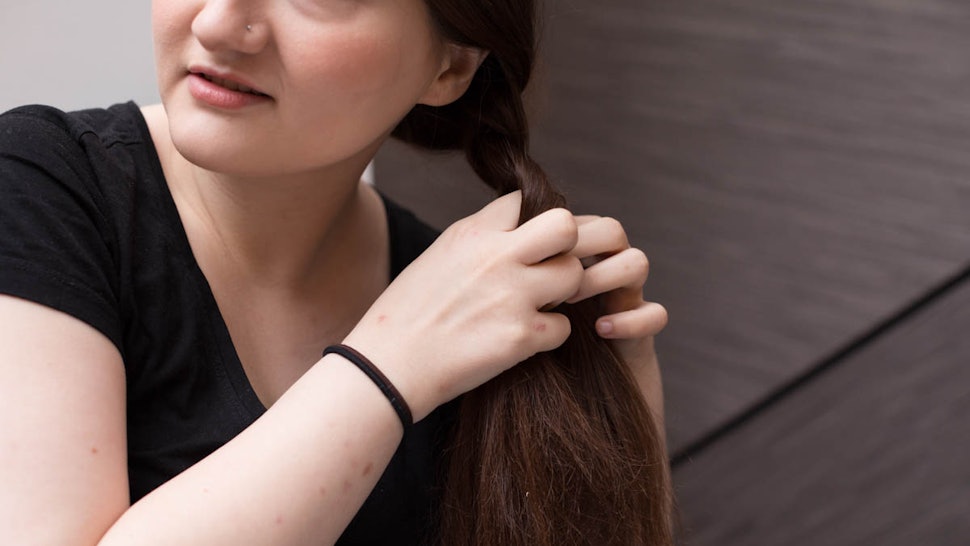
Ashley Batz/Bustle
Perhaps it’s obvious, but it’s amazing how connected everything in the body really is. When one part is off balance, it really can affect everything else. And signs that something is going on in your body can show up in unexpected places. What your hair can tell you about your health, for example, might be pretty surprising!
First off, if you are interested in the health of your hair in general, Lauren Fink, a hairstylist at Pechanga Resort Casino tells Bustle some easy ways to find out if your locks are in good shape.
“Get a mixing bowl and fill it with cold water,” Fink says. “Dunk your hair into the bowl. Does it float or does it sink?”
If it floats, she says, your hair is healthy and your skin is probably hydrated to boot. If it sinks, well, that might mean your hair is a bit on the be brittle side and perhaps damaged, which is why it takes on the water instead of remaining buoyant.
Fink also recommends running a dryer sheet across your hair. Not only does thistame frizz or flyaways, but if you run the dryer sheet and the frizz just won’t go away, especially if your hair isn’t naturally curly or frizzy, there may be an underlying problem. Her advice is to drink lots of H20 and to give your hair a break from heating tools and products for at least the weekend.
Below, take a look at what some other pros have to say about the hair and body connection.
1. You Might Be Having Thyroid Issues
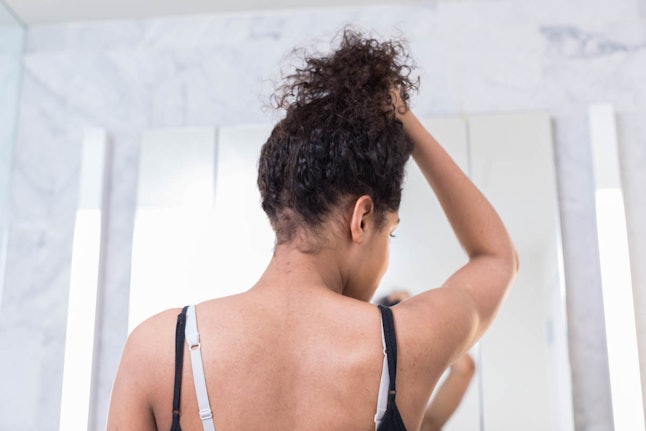
Adina Mahalli, a hair and skincare expert from Maple Holistics, tells Bustle that because hair follicles are regulated by the thyroid hormone, low levels cause hair follicles to stop regenerating.
“This can lead to an increase in hair loss or patchy regions on the scalp,” Mahalli says. “In some cases, hypothyroidism can lead to coarsening of the hair. If you notice that your hair is thinning or breaking easily, it could be a sign of an underlying thyroid issue.”
Visiting a healthcare professional to get your hormone levels checked is a good idea if this is a recurring problem
2. You Could Be Low On Iron
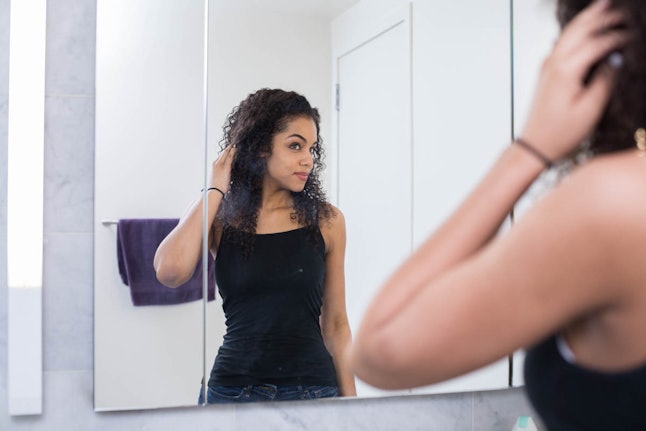
“A common sign of an iron deficiency is hair loss,” says Mahalli. “Iron is an essential nutrient in a number of bodily functions, including healthy hair.”
So, if you’ve noticed that you’re losing a significant amount of hair after the shower or when you brush, it could be a sign of anemia.
This is another thing you can check out with a healthcare provider, and can be addressed through what you eat and supplements.
3. What You Eat Might Be Lacking

It always comes back to what’s on the plate, doesn’t it?
“Your diet is your body’s main intake of nutrients, which means that your diet could be to blame for the quality of your hair,” says Mahalli. “If your hair lacks shine or is prone to breakage, [it could have to do with what you eat].”
Try incorporating more fresh fruit and vegetables into your meals, as well as protein to strengthen your hair and bring it back to life, she says.
4. You Could Need More Water

Hydration, hydration, hydration. For the love of your hair, keep that water bottle filled all day long.
“Water makes up almost 25% of the weight of a single strand of hair,” Jacynda Smith, hairstylist and founder of beauty company TYME, tells Bustle. “If you are not staying hydrated by drinking enough water your hair can become dehydrated, leading to split ends and more oil production from the scalp.”
If your hair is not growing as quickly as you think it should and gets oily fast, try drinking more water, she says. Two liters is the recommended amount for your hair.
5. Your Gut Might Be Out Of Whack
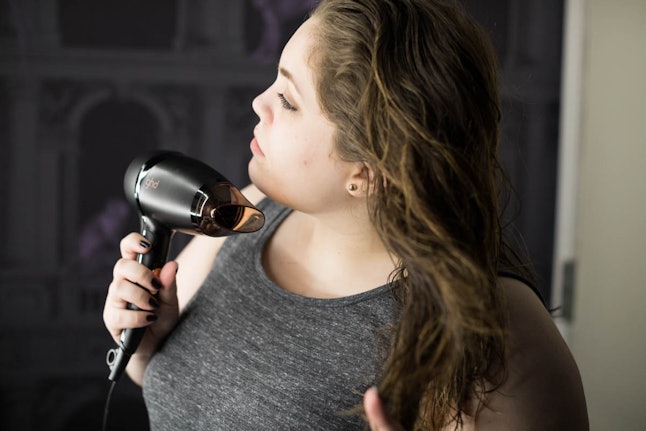
Who would think these two things were connected, you know? But the gut and your digestive system pretty much affects everything.
“If your gut is in bad shape, it could be affecting the health of your hair,” nutritionist Lisa Richards, tells Bustle. “Some of your gut bacteria produce biotin, while others break it down. A healthy gut microbiome will have a combination of the two, but sometimes this is thrown out of balance. Biotin is crucial for healthy hair, so if you don’t produce enough then your hair will suffer.”
Working on your gut, she says, can be helped along with probiotic supplements, fermented foods, and gut-healing foods like bone broth and cabbage juice.
6. You Might Want To Check For Autoimmune Disorders
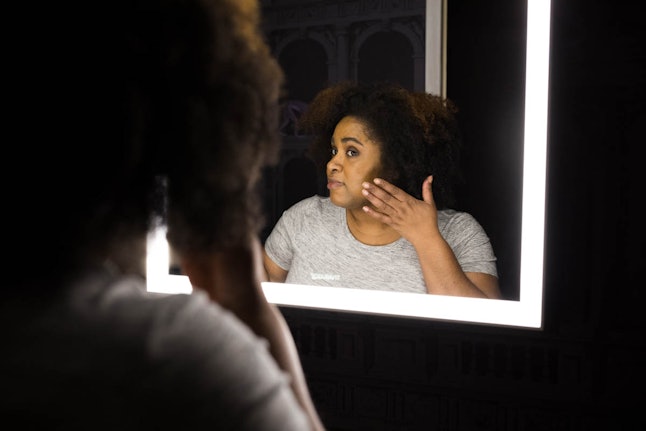
“If you notice gray hair at a very early age in life, it may potentially be linked to certain health conditions,,” Dr. Nesochi Okeke-Igbokwe, tells Bustle.
For example, premature graying of the hair may occur in those with the autoimmune condition vitiligo, in which the immune system can attack the pigment producing cells of the skin. But remember, the age you grey is also genetic, so it’s can be totally natural for you!
7. You Could Be Having Hormonal Shifts
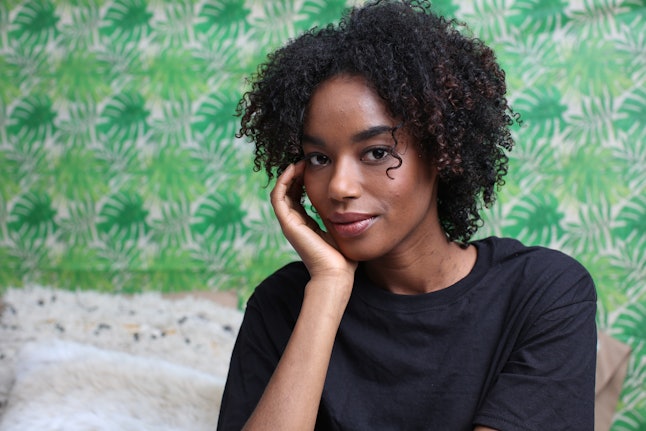
Major hormonal shifts during your life can also show up in your hair.
“Pregnancy, postpartum, and perimenopause are all periods in a woman’s life marked by major hormonal shifts, and hair loss is commonly related,” women’s health coach Karen Shopoff Roof, tells Bustle.
“As estrogen levels lower in the postpartum period and perimenopause, hair growth slows,” Shopoff Roof says. “This can feel like hair loss, because hair is no longer as thick or lush as it used to be, when in fact it’s simply your body returning to expected hormone levels.” This is all very common.
Although some of these issues are more serious than others, worry not. These experts agree that its most commonly hydration or what you eat that can help hair if you are feeling a little dry or brittle. But it’s still pretty amazing what your strands can tell you, don’t you think?
Learn more on Bustle


